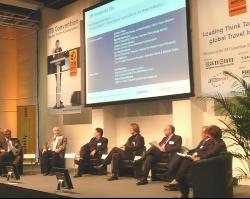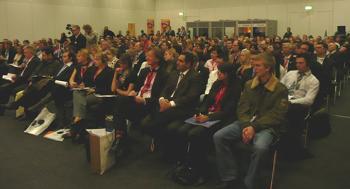ITB Hospitality Day 2008: Hotels seriously tackling environment
 |
Berlin (March 14, 2008). Sustainability and ecologic concepts were the major topics at this year`s ITB. At the ITB Hospitality Day, representatives from the fields of research and renowned international tourism companies like Hilton, Emirates Hotels and Schloss Elmau explained their forward-looking strategies in terms of sustainability, backing up their statements with scientific findings. With more than 300 visitors this panel discussion (photo) was the most frequented one at this year`s ITB - a clear sign of the topicality of the issue.
There was unity on the stage: there is no other way than the green way. Although not all guests are willing to pay more for environmentally friendly concepts, the change is in progress. "A survey of the JD Powers market research institute found out that guests are willing to pay up to ten percent more for a trip with a good environmental concept," emphasised Welf J. Ebeling, Executive Vice President and COO of Leading Hotels of the World" and was supported by Dr. Manfred Stock of the Potsdam Instiute for Climate Impact Research in this respect. "Ten percent is the absolute limit," he agreed.
But do sustainable concepts and environmentally friendly behaviour definitely require increases in rates for guests? Dietmar Mueller-Elmau, owner of Schloss Elmau at Garmisch-Partenkirchen, put this into question again and again. "It is not the question whether to raise prices, but to reduce consumption instead," he said to his colleagues and explained how a hotel with five pools and three spas could be heated at low-cost and CO2 neutrally by showing his wood thermal power station. Mueller-Elmau saves 200,000 to 300,000 euros per year by implementing a wood combustion facility with an investment volume of 1.2 billion euros. And: he receives money from the government for using this system, as cutting down trees contributes to protecting rare flowers.
Building resorts only when energy is generated
His example, said Mueller-Elmau bringing his colleagues down to earth again, could not be transferred to every hotel. The wood comes from the near vicinity of the hotel and can therefore be delivered within short time. A lot of space is required for the wood transporter that supplies the hotel every third or fourth day. He advises the industry: "Build new resorts where you can generate the required energy by yourself. And if that is not possible, leave it."
Thanks to solar technology and new methods for exploiting oceans as supporting sources of energy, generating energy is increasingly becoming easier. Introducing Hayman Island at the Great Barrier Reef, Welf J. Ebeling explained how six-degree cold water can be sucked up from the sea bottom straight into hotels by implementing a sort of straw principle. The water arrives at a temperature of 16 degrees, is blended with a bit of warm air, and then piped into the air conditioning system of the resort at a temperature of 18 to 20 degrees.
The Leading Hotels of the World introduced the "The Leading Initiative" programme in April 2007. It serves to avoid carbon dioxide emissions and is to enable guests to make a conscious decision in favour of more environmentally friendly travel behaviour. With this, they support the Sustainable Travel International (STI) environmental protection organisation. For each night that guests book via www.lhwgreen.com - or, in case of booking via phone - upon mentioning Leading Green, Leading donates an amount to STI that equals 29.3 kilowatt-hours of electricity generated by new energy sources.
 |
More than 300 visitors listened |
Hilton Hotels Worldwide that was represented by Andrew Forte, Director Europe for Energy and Sustainability, at the Hospitality Day, also works in an environmentally friendly and cost-saving way. Hilton`s "We care" programme integrates all the company`s employees and is accompanied by engineers. It primarily concentrated on the two major topics of energy and water. Since introduction in 2005, the company has managed to reduce its energy costs by ten percent, while four hotels of the group have already received environmental protection awards. However, Forte learned that guests quickly forget about their environmentally friendly behaviour during their vacation. "Even the most environmentally aware of them usually leaves water taps turned on," he says. Implementing modern technologies for interrupting water flows is all the more important in this respect.
Tony Williams, Vice President Resorts & Projects at Emirates Hotels & Resorts mentioned the special role of guests when it comes to climate protection. Accordingly, it was imperative to try and bring about a sustainable change in guests’ awareness. In case guests rightly demand high environmental standards from hotels - they should also stick to these standards at home, where they usually spend more time during the year.
On the rise: energy exchange markets and new financing models
Michael W. Hartmann, Head of Hospitality Solutions at Siemens Technology in Munich, represented the technology industry at the Hospitality Day. He pointed out that states will increasingly intervene in a regulative way. In China, there was an energy exchange market for each new building. An energy volume is granted to each building. If buildings achieve less, owners can resell their energy share.
Hartmann sees approaches towards sustainability primarily in terms of new buildings. Here, the routine behaviour of guests could be evaded best by implementing new technologies. "Modern electronics make it possible to measure the energy consumption of individual rooms," said Hartmann. More transparency could lead to rewarding guests for environmentally friendly behaviour as well, said the expert. Siemens has financing models at hand making environmentally friendly technologies affordable even for hoteliers in developing countries. "We guarantee savings and receive the money saved later on. If there are no savings, it would be a problem of Siemens," said the manager. By explaining the business travel standards of Siemens, Hartmann made clear how serious his company is about environmental protection: There is maximum kerosene consumption per business traveller. Those exceeding this maximum are not allowed to travel anymore.
The presence and presentation by Tony Williams about the activities of Emirates Hotels & Resorts in Dubai showed how important sustainability has become for the future. He confirmed that Arab countries were thinking a lot about sustainable tourism in the meantime. "We built the first hotel running on solar energy," said Williams. Furthermore, construction of another ski hall operated with conventional energy had been postponed. Williams also explained the concept of the company`s new resort projects that seem hardly sustainable at first sight. In Australia, Emirates will erect a resort on a 4,000 sq m area belonging to a protected nature reserve. Williams explained further that this would definitely contribute to the protection of Australia`s nature as the resort would take up only one percent of the total area. On the remaining area, endangered species will be colonised. In this way, the life of endangered species would be protected, just as with the protective zone around the Al Maha Desert Resort in Dubai.
Serious concepts wanted
All participants in the panel assured with plausibility that their environmental protection concepts had a serious background and were not superficial marketing gags. In the meantime, companies try to jump on the trendy bandwagon of environmental protection appeasing their bad conscience with outward actions. There is already a term for this kind of pseudo environmental awareness called "greenwashing". However, the hospitality panel treated this topic with a seriousness that gives reasons for hope.
In the end, as Professor Martin Stock emphasised at the beginning of the session, humanity still had a chance to change tack. "We can reduce carbon dioxide emissions," he said convincingly, but warned of too long optimistic inactivity. "If we continue our business as usual, the hot summer in 2003 will be normal in 30 years, and it will be considered a cool summer later on," he warned showing shocking pictures of climatic disasters of the past ten years. "Sometimes I ask myself whether we are not too slow with informing people about the results of climatic change," said Stock. The environmentally friendly demands made on the industry expressed at the Hospitality Day should have been understood by visitors and representatives. / Susanne Stauss
To print this article you have to be registered and logged in for newsletter, visitor or subscription.





